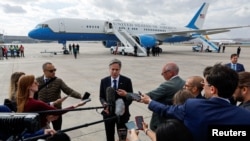U.S. Secretary of State Antony Blinken reaffirmed Monday that the United States maintains its focus on the Indo-Pacific region despite concurrent global challenges, such as the Israel-Hamas conflict.
At the Ankara airport, after concluding a two-and-a-half-hour discussion with Turkish Foreign Minister Hakan Fidan, Blinken said, “Even as we intensely focus on the crisis in Gaza, we are equally engaged in the vital work in the Indo-Pacific and other parts of the world to advance American interests.”
The top U.S. diplomat will arrive in Tokyo on Tuesday for the Group of Seven foreign ministers’ meetings and bilateral talks.
Blinken said he plans to debrief his counterparts from G7 about the recent Middle East visit.
Japan chairs this year’s G7. Supporting Ukraine’s economic recovery and energy needs, as well as regional security are on the agenda in Blinken’s bilateral meetings with Japanese Prime Minister Fumio Kishida and Foreign Minster Yoko Kamikawa.
Kishida just returned from Manila and Kuala Lumpur where he confirmed that Japan will promote bilateral defense and maritime security cooperation with the Philippines and Malaysia.
On Sunday, Kishida, during a joint news conference with Malaysian Prime Minister Anwar Ibrahim, announced that both countries had agreed to "accelerate adjustments towards the implementation" of the official security assistance grant program, known as OSA.
Japan has designated four Asia-Pacific countries — Bangladesh, Fiji, Malaysia, and the Philippines — as recipients of the OSA. Under this program, Japan provides materials, equipment and assistance for infrastructure development based on the security needs of these countries.
In Manila, Kishida and President Ferdinand Marcos Jr. of the Philippines confirmed Friday that both countries would start negotiations on a reciprocal access agreement, a new bilateral deal aimed at strengthening defense cooperation.
Japan also agreed to provide the Philippines with coastal radar systems under the OSA program.
Both the Philippines and Japan have been seeking to enhance trilateral defense ties with the United States in response to what they perceive as China's increasing military aggression in the East and South China Sea.
Japan rejects China’s sovereignty claims over the Senkaku Islands located in the East China Sea. The Philippines and China are on a collision course over the contested South China Sea, as shown in last month’s incident in which Chinese ships blocked and collided with two Philippine vessels near the Second Thomas Shoal.
Following the collision, U.S. President Joe Biden reiterated Washington’s “ironclad” defense commitment to the Philippines.
The United States has supported Japan’s decision to discharge treated radioactive water from the crippled Fukushima Daiichi nuclear plant into the Pacific Ocean in August. Blinken said on August 15 that the U.S. is satisfied with Japan’s “safe, transparent, and science-based process.”
But despite assurances from Kishida’s government and external monitors including the International Atomic Energy Agency, the move has brought furious opposition from neighboring countries and environmental organizations who questioned its safety.
China, for example, has banned all seafood imports from Japan. Beijing’s fierce protest also came at a time of increased geopolitical tensions between Japan and China.
“The PRC is hypocritically banning Japanese seafood while fishing from Japan’s waters for the exact same fish. Can’t blame them since the fish is outstanding but can blame them for their hypocrisy. America is sending this fish to a more deserving market: our U.S. military service members and their families,” said U.S. Ambassador to Japan Rahm Emanuel in a social media posting on X, formerly known as Twitter. He was referring to People’s Republic of China.
Before heading to Asia, Blinken was in Israel, Jordan, West Bank, Iraq and Turkey where he reaffirmed Washington’s support for humanitarian pauses in Gaza to allow the delivery of lifesaving aid to civilians as Israel intensifies its offensive on Hamas targets in the Gaza Strip.





